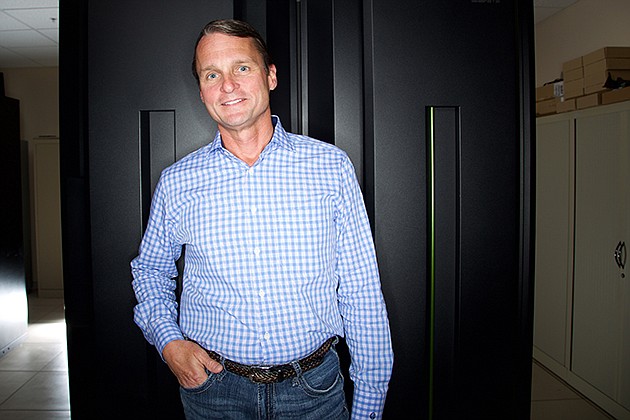Executive Summary
Company. ASG Industry. Technology Key. If you must restructure the balance sheet, do it quickly to save the business.
To understand the culture shift happening at Allen Systems Group today, consider Ernest Scheidemann's wardrobe.
On a recent visit to the company's headquarters in Naples, the executive vice president and chief financial officer greets you in jeans and an open-collared shirt. It's a small detail that would never be noticed in Silicon Valley, but at Allen Systems, where formal suits once were the dress code, it signals change is afoot.
Better known by its initials, ASG is somewhat of an anomaly in Naples, a retirement and vacation haven. It's a high-tech software company that helps giant corporations such as American Express, Coca-Cola and General Electric manage mountains of data. Its founder was Arthur Allen, who retired to Naples in 1981 when he was 34 years old after he sold his first software company for $18 million.
But following years of rapid growth, the recent recession combined with mounting debt took its toll. ASG recently made a quick two-month dash through Chapter 11 bankruptcy reorganization, and Allen resigned. The reorganization in Delaware bankruptcy court registered only whispers in Naples, where Allen has been a big benefactor to various charitable causes and a champion for economic diversification.
ASG had grown rapidly through more than 60 acquisitions throughout its 28-year history, piling up as much as $660 million in debt. “Most of those over the years worked really well,” says Scheidemann, who joined ASG in 2008 after a stint as chief financial officer for Bonita Springs-based developer WCI Communities.
But ASG's European acquisitions during 2011 and 2012 didn't perform as expected, Scheidemann says. Investors who purchased the company's debt, including private equity firms Blackstone and Kohlberg Kravis Roberts, negotiated with Allen to orchestrate what's called a “pre-packaged” reorganization plan where all parties agree to the restructuring prior to filing with the court.
The creditors agreed to swap a portion of the debt for equity, eliminating 60% of the debt and leaving ASG with a more manageable $240 million debt.
“Great company, bad balance sheet,” explains Brad Colman, a principal at GSO Capital Partners, the credit arm of Blackstone. “Allen Systems has a very strong suite of products, a proven history of delivering leading solutions to a blue-chip customer base.”
Scheidemann says the company's revenues were $250 million last year and he expects a similar result this year. “It's a big ship to turn,” he says.
Reorganization certainty
The company tried to stave off bankruptcy last year. It considered a sale, a recapitalization and refinancing, but none of those options was palatable. “The opportunity in the market would not have been in excess of the debt,” Scheidemann says.
But filing for Chapter 11 reorganization carried some big risks. That's in part because it's unusual for software companies to file for reorganization and do it successfully. “Software companies are not asset-based entities,” Scheidemann says.
If Allen or others contested the bankruptcy, the likelihood of ASG surviving a restructuring would have been less likely. A contested Chapter 11, says Scheidemann, “is a much longer process, a more costly process and it's much more damaging to the business.”
According to a settlement agreement filed as part of the bankruptcy proceedings, Allen agreed to resign and pledged not to solicit employees, compete with the company or make disparaging remarks about ASG. In return, ASG agreed to pay Allen $6.25 million plus a consulting fee of $375,000 a month for four months.
Another challenge was keeping key customers and employees through the reorganization. “You lose some talent,” Scheidemann acknowledges. But he noted that the company didn't lose any key employees once ASG filed for reorganization because of the opportunity of a fresh start.
A more casual dress code in line with technology trends with less time-clock management were welcome changes among the staff who had managed through uncertainty. ASG has 133 employees in Naples and more than 1,000 in 60 offices around the world, including in Europe and Asia.
Scheidemann also says he was “pleasantly surprised” that no significant customers gave up on ASG, though spending on new products remained muted while it reorganized its finances. He credits informing customers of the company's reorganization strategy as a key to that success.
Fact is, ASG runs software that's critical for managing large amounts of data, which can be costly and difficult for customers to replace. “You have legacy products which are proven, they're very sticky,” says Colman. “People will stick with you if your products are working.”
A fresh start
Even with a smaller debt load, ASG has a ways to go based on financial statements filed with the bankruptcy court. For example, ASG reported $16.9 million in revenues for the month of February. Of that sum, $12.4 million was for software maintenance and $2.9 million for licenses.
ASG posted a $1.3 million operating loss in February, but bankruptcy restructuring charges totaled $2.3 million. That means ASG could be posting an operating profit soon, though Scheidemann declines to disclose additional financial details of the privately held firm. “We're getting close,” he smiles. “We'll be on that [profitability] track by the end of the year.”
ASG is currently searching for a CEO. Colman, a director on the company's board, says a new CEO with a tech industry background will be appointed in the months ahead.
“We want to get the business growing,” Colman says. “I'm pretty excited about their offerings in cloud.”
Many ASG customers are large companies that continue to operate their own big mainframe computers. But some companies are now shifting their data and software to the Internet “cloud” where it can be accessed remotely. Software-as-a-service revenue is a small part of ASG's total revenues, but it could grow in the future.
Either way, large companies are increasingly responsible for maintaining large volumes of data for government compliance. Increased government regulations in many industries have forced companies to invest in software such as ASG's to manage and retrieve data that regulators now increasingly demand.
What's more, ASG will now have an entree to prospective customers that are owned by its private-equity investors. And ASG is global: Scheidemann says about 40% of its business is international.
While ASG is smaller than some of its rivals, Scheidemann says being a smaller privately held company gives ASG opportunities to exploit niches such as government compliance. “We're a bit more nimble,” he says.






